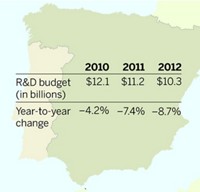Advertisement
Grab your lab coat. Let's get started
Welcome!
Welcome!
Create an account below to get 6 C&EN articles per month, receive newsletters and more - all free.
It seems this is your first time logging in online. Please enter the following information to continue.
As an ACS member you automatically get access to this site. All we need is few more details to create your reading experience.
Not you? Sign in with a different account.
Not you? Sign in with a different account.
ERROR 1
ERROR 1
ERROR 2
ERROR 2
ERROR 2
ERROR 2
ERROR 2
Password and Confirm password must match.
If you have an ACS member number, please enter it here so we can link this account to your membership. (optional)
ERROR 2
ACS values your privacy. By submitting your information, you are gaining access to C&EN and subscribing to our weekly newsletter. We use the information you provide to make your reading experience better, and we will never sell your data to third party members.
Policy
Scientists Protest In France
Researchers object to proposed restructuring of CNRS
by Sarah Everts
June 2, 2008
| A version of this story appeared in
Volume 86, Issue 22

THOUSANDS OF SCIENTISTS in 10 cities across France marched in protest on May 27 to voice their disapproval of a proposed reorganization of the National Center for Scientific Research (CNRS), the country's prestigious research agency.
The scientists were reacting to statements by Valérie Pécresse, the French minister for higher education and research, who told the newspaper Le Monde that the government of French President Nicolas Sarkozy was planning to split CNRS into six separate institutes. Pécresse could not be reached for comment by C&EN's press time.
Pécresse told Le Monde that existing CNRS departments, which are sprinkled across the country, will be reorganized into separate institutes for chemistry, physics, engineering science, mathematics, and ecology and biodiversity, as well as humanities and social science.
The silo-like restructuring "has a savor of the 19th century," says Bruno Chaudret, director of the CNRS Laboratory for Coordination Chemistry, in Toulouse. He says some reforms could improve CNRS, but the ones proposed by Pécresse motivated him to join the march in Toulouse, where demonstrators made a small pyramid of theses and papers amid "pouring rain."
Notably left off of Pécresse's list of new CNRS institutes were life sciences and computer informatics, says Fabrice Rappaport, a group leader at the CNRS Institute of Physicochemical Biology, in Paris, where some 3,000 people marched in the streets.
The government plans to link many existing life sciences departments, which account for 23% of CNRS's current budget, to the National Institute for Health & Medical Research (INSERM). Chaudret worries that the merger would harm fundamental life sciences research in France.
Another source of concern, Chaudret says, is Pécresse's suggestion for how the heads of these new institutes will be selected. Pécresse told Le Monde that the ministry of research, rather than CNRS, will make final selections. However, scientists worry that government decisions about CNRS leadership "could be swayed by politics or industry," Chaudret says.
Pécresse made her restructuring announcement while the government was still in the midst of a discussion series with CNRS scientists about possible ways to reform the agency, Rappaport adds. "Many people feel a bit betrayed by this act of the government," he says.




Join the conversation
Contact the reporter
Submit a Letter to the Editor for publication
Engage with us on Twitter